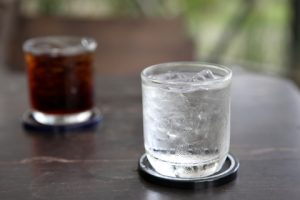In the battle of beverages, diet drinks made the headlines this week, beating out water as a weight loss aid according to a new study. Understanding how our food and beverages may affect weight gain or loss is important to cancer prevention, because being overweight or obese is a major risk factor for eight cancers, including colorectal and post-menopausal breast.
The study adds to the limited, but growing body of human research on diet beverages. The role of diet beverages in weight control is controversial, but the role of sugary beverages is not. AICR recommends avoiding sugary sodas and drinks because they are strongly linked to weight gain, overweight and obesity.
The study, published online in Obesity, found that of the approximately 300 overweight participants, those consuming the diet beverages lost more weight over 12 weeks than the group consuming water. The difference was small, but significant, with the diet drink group losing an average of 13 lbs and the water group, 9 lbs.
For the trial, one-half of the participants were instructed to drink at least 24 ounces of water daily and not to consume any diet beverages. The other half were told to drink at least 24 ounces of diet drinks, but they could also drink water.
All participants also attended weekly group meetings as part of their behavioral weight loss program, to help with weight loss strategies, including learning about portion sizes, self-monitoring and physical activity. They all received the same information, except for instructions on drinking water or diet drinks.
Although it isn’t clear why the diet drink group would lose more weight than the water group, one finding that could be a factor was that the water group reported more hunger than the diet beverage group. The authors note too, that all participants came into the study drinking diet beverages, so the water group had to make the greatest behavior change – switching from diet drinks to water.
This 12-week study was part of a larger 1-year trial also looking at weight loss maintenance. At the end of the year, researchers will determine how successful participants were at keeping the lost weight off.
For now, there’s no controversy that water is a great way to quench your thirst – and if you need a little flavor, we have some great ideas here to help you jazz it up. However, if you are cutting back on sugary beverages and find diet drinks helpful in losing weight, they can be part of your overall program to make healthier choices and reduce your cancer risk.
This study was funded by the American Beverage Association. Two authors, John C Peters and James O Hill received consulting fees from the Coca-Cola Company outside of the submitted work.






Hello, I am a three time cancer survivor. I do not drink soda of any type.
Could you please advise me of what type of sweetener the diet sodas use? I have always been told that artificial sweeteners are not good for me.
Thank you for your time,
Maryjane Mote
Hi Maryjane,
Here is an article that may be helpful to you in learning more about sweeteners of many types.
http://www.bottomlinepublications.com/content/article/health-a-healing/the-truth-about-sugar-and-artificial-sweeteners